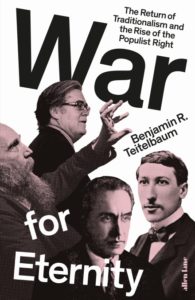
Yesterday, UnHerd featured an article by Gavin Haynes that was equal parts fascinating and disturbing.
It was about the weird connections between the Right-wing fringes of politics and what can be loosely described as the occult.
Today’s Right-wing populists are, for the most part, keen to distance themselves from outright fascism. Nevertheless, it’s interesting that so many of them share the Nazis’ interest in esoteric belief systems.
Why would that be? Haynes, drawing upon a new book, The War for Eternity by Benjamin R Teitelbaum, argues that ancient mysticism is being seized upon as a kind of antidote the atomised, rationalistic modernism that the Right-wingers hate. Indeed, it speaks to a much broader-based yearning:
It reminds us, just as Covid does, that we are much more than the sum of our economy and our empowerments.
I’m sure that’s true, as is Haynes’ warning that “if we ignore these other elements for too long, they will always burst out unexpectedly. Perhaps unpleasantly.”
Of course, if all that the nationalists really wanted was a more spiritual dimension to life, then they could find it within the more familiar faiths. Sometimes they do. Viktor Orban, for instance, likes to portray himself as a defender of ‘cultural Christianity’.
But esoteric belief systems can offer the ideologues something that they’re denied by the mainstream religions: an advanced degree of exclusivity. ‘Occult’ literally means ‘hidden’ and, throughout history, human beings have been attracted to the promise of secret knowledge.
Whereas the great proselytising religions preach the good news to all-and-sundry (or, at least, they ought to), there also exists a very different religious mode — which is about the unlocking of hidden mysteries for a privileged few. Indeed, such systems often feature ascending levels of enlightenment, to which admittance becomes progressively more exclusive and/or expensive.
It’s not surprising that these systems should prove so attractive to political ideologies that are based on feelings of specialness and superiority.
That said, there’s a dark human instinct here that extends well beyond the political fringes or anything to do with the supernatural. You can see it in our excessive regard for certain categories of credentialed expertise — and the way that we’ve privileged theoretical knowledge over practical experience. Even something as trivial as the cult of celebrity — with its A-lists and B-lists etc — oozes with the same malign power.
The supreme irony is that the human desire for exclusivity is universal.










Join the discussion
Join like minded readers that support our journalism by becoming a paid subscriber
To join the discussion in the comments, become a paid subscriber.
Join like minded readers that support our journalism, read unlimited articles and enjoy other subscriber-only benefits.
Subscribe